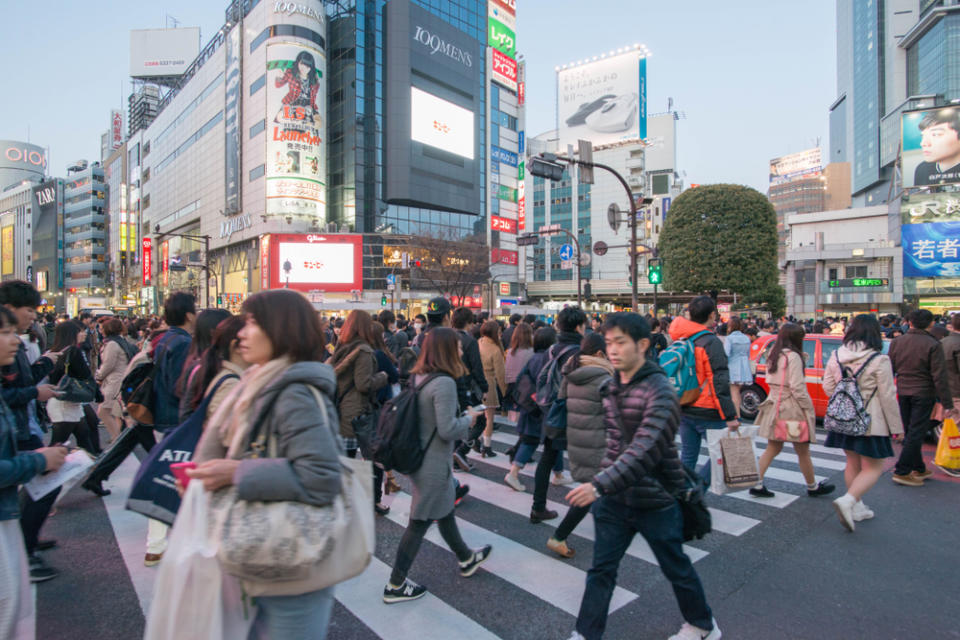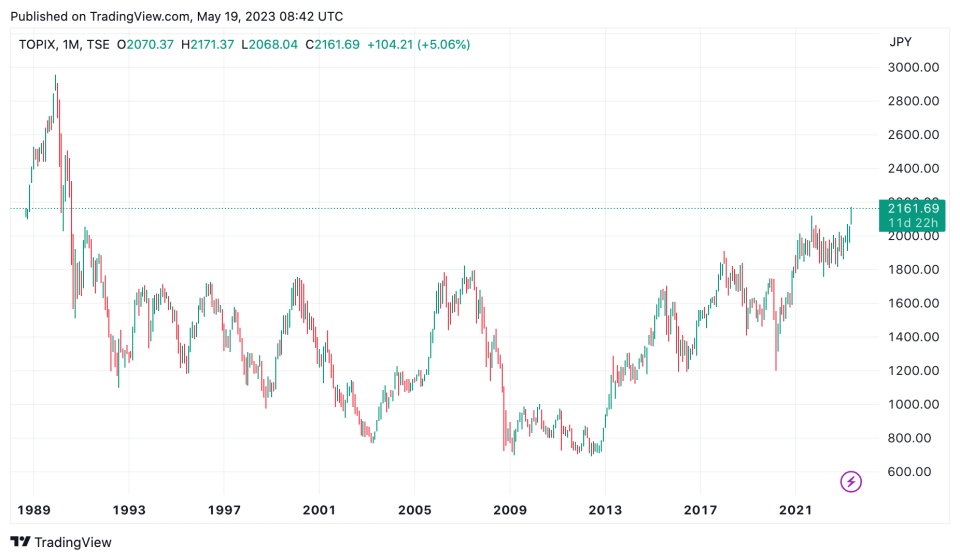Japan is the only developed economy in the world that still maintains quantitative easing. With the inflow of hot money, the Japanese stock market hit a new high this year, and even touched the level of the economic bubble burst in the 1990s. Many people even admire the “stock god” Buffett who bought five major trading companies in Japan at the bottom, but how will the Japanese stock market develop in the future?

The Nikkei average rose 0.77% today (19th) to close at 30,808.35 points. Its highest point was 30,924.57 points. It has risen by about 18% this year. In addition to hitting a new high this year, it also hit a new high since the economic bubble burst in August 1990 .
The broader Topix stock index also rose 0.18% today to close at 2,161.69 points, which is also a new high in the past 33 years. It has also risen by more than 14% this year.
Although the above two have not yet regained the historical highs in December 1989, they have made the market look forward to whether Japan has emerged from the haze of the economic bubble burst in the 1990s and regained growth.


Analyst: Japanese stocks are cheaper to attract foreign capital
Analysts at Goldman Sachs Group Inc. and strategists at Macquarie said the bull market was fueled by corporate governance reforms that boosted valuations, combined with the country’s loose monetary policy.
Belita Ong, chairman of Dalton Investments, pointed out that the Japanese market has been cheap for a long time. Both encourage foreign capital to return to the Japanese market.”
I also think that Japanese stocks are flat enough, including Buffett. His investment flagship Berkshire Hathaway (US: BRK) has bought five major Japanese trading companies (i.e. Itochu Corporation, Mitsubishi Corporation, Mitsui & Co., Sumitomo Corporation and Marubeni), he revealed earlier that he has increased his shareholding in Japan’s five major trading companies to 7.4%, and he may consider further investment.

Kazuo Ueda, the newly appointed governor of the Bank of Japan, has repeatedly stated that he has no plans to change the quantitative easing policy, which keeps the yen at a low level and increases the purchasing power of foreign capital, making the Japanese market more attractive. The dollar was last at 138.16 per day.
Foreign investors have been net buyers of Japanese stocks for the sixth straight week, buying 781 billion yen (about HK$44.2 billion) worth of stocks and futures in the week to May 12, according to exchange data released on Thursday. .
Although the Japanese stock market has accumulated a lot of gains this year, it is still undervalued compared to other markets. Jeff Kleintop, Chief Global Investment Strategist of Charles Schwab Financial Group, pointed out that Japanese stocks may be fully fired, further surpassing U.S. stocks.
【read more】The Japanese stock market is booming, is it still too late to get in the car?
Watch out for inflation data
It should be noted that the biggest risk in the Japanese market is the policy shift of the Bank of Japan, and the country’s inflation will be the key. Japan’s latest inflation data released today hit a 40-year high and continued to exceed the central bank’s 2% target, showing where the risks lie.
Japan’s national core consumer price index rose by 3.4% year-on-year in April, in line with market expectations. After deducting fresh food and energy items, the core CPI rose by 4.1% year-on-year, the largest increase since September 1981.
The overall consumer price index rose 3.5% year-on-year in April, higher than the expected 2.5%.
Kazuo Ueda said today that he will patiently continue to implement monetary easing and will not hesitate to increase easing if necessary, but emphasizes that the cost of changing policies prematurely may be very high.
He still maintains his earlier estimate that high inflation is only short-term. He expects inflation to slow below 2% by the middle of this fiscal year.

Fortune Insight and the “Wall Street Journal” jointly launched a new subscription plan “FI Prime Plus”. Just enter the promotion code “FIP30free” and you can read the entire network content of the “Wall Street Journal” and most of Fortune Insight’s paid content for free for one month
Subscribe here:https://prime.fortuneinsight.com/web/wsjSubscribe FORTUNE INSIGHT Telegram:
http://bit.ly/2M63TROSubscribe FORTUNE INSIGHT YouTube channel:
http://bit.ly/2FgJTen
Further reading:Exchange Yen 🇯🇵 pips come first?Compare the latest exchange rates at bank money changers
2023-05-19 10:49:55
#Japanese #stocks #bull #marketJapanese #stocks #rising #hitting #highs #bubble #burst #years #Analyst #surpass #U.S #stocks

